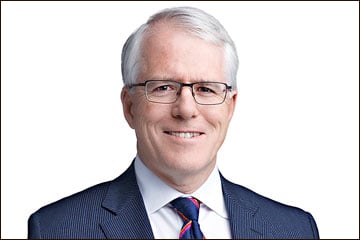
Canadian clients will benefit from Gowling WLG’s growing intellectual property practice in Beijing, says Robert MacDonald, co-leader of the Gowling’s global IP group and partner in the Ottawa office.

Canadian clients will benefit from Gowling WLG’s growing intellectual property practice in Beijing, says Robert MacDonald, co-leader of the Gowling’s global IP group and partner in the Ottawa office.
In addition to the firm’s practice Guangzhou — a major export port for international businesses — the firm will now offer more intellectual property services in the government center in Beijing, particularly when it comes to registering trademarks and patents, says MacDonald. The extension of the Chinese practice was announced by Gowling WLG on June 14. The firms says that five people will be moving into the newly formed Beijing office.
In the decade that Gowling has operated in China, the court system has evolved rapidly, building on an intellectual property scheme that started as recently as the 1980s, says MacDonald.
“[Clients] have this perception of China as a source of counterfeit goods. It is — not to suggest it’s not — but they have a concern that there is nothing they can do in China to protect themselves. What we have seen is actually quite the opposite,” says MacDonald. “The Chinese government has been setting up specialized IP courts, and they are becoming much more knowledgeable and much more understanding of the issues. Our experience over last 10 years is that if we have obtained the proper protection at the outset — we have our trademark or patent protected in China — then the Chinese courts are quite willing to work with us to stop infringements and counterfeit goods.”
As Canada changes its own intellectual property rules this week, lawyers are also increasingly helping Canadian businesses expand internationally. China is Canada's second-largest trading partner, according to the Canadian government. Still, intellectual property remains a concern — retailers such as those at Toronto’s Pacific Mall have been monitored for IP violations in the U.S. Trade Representative’s “Notorious Market” list.
MacDonald says that while China is known for its powerhouse manufacturing pipeline, countries like Russia and China are also drawing more recent interest from international brands looking to sell goods to the burgeoning middle class.
“I’ve been practising in IP law for several decades and what’s interesting right now is just how important IP is to every company. If you look at major corporations today, the value of their brand is key to their success. So, when I look at China, I’m looking at one of the biggest markets in the world in terms of population — a vast, growing economy. Not being present and protecting and exploiting your brand in that market would be short-sighted,” he says.
MacDonald says that the same principles apply to Canadian businesses who are just using China as a manufacturing center to export goods back to Canada.
“For Canadian businesses generally, we’ll often get requests like, ‘Is it worth my while trying to obtain a patent or to register a trademark in China?’ Our answer to any Canadian business is, ‘Yes, it is,’” says MacDonald. “Many Canadian companies don’t see that as being of concern. But if you are having your goods made in China — putting your brand on the goods in China — even though...they are just coming back to Canada, you want to avoid any issues locally.”